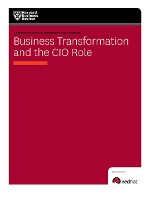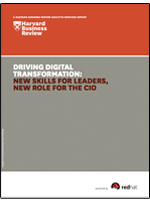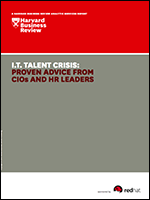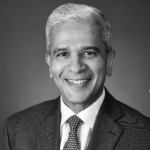This week, The Enterprisers Project celebrates its third anniversary. We've had a front-row seat to the changing priorities of the CIO over the last few years.
Early on, we heard a lot about what CIOs should be doing about shadow IT and why they needed to begin building strategic relationships with their peers in the C-Suite and the rest of the business. Today, we’re hearing CIOs talk more about how they’re being tapped to come up with revenue-generating products, improve customer experiences, and take on more duties than ever before.
Take a trip down memory lane with us as we look back at some of the most popular articles on the site from the last three years. The headlines and quotes below are a time capsule of the strategies, concerns, and solutions that helped to shape the role of the CIO into what it is today.
2013 - 2014
Starting in 2013 and leading into 2014, enterprising CIOs told us that to be successful, today's CIOs needed to get a seat at the table in the C-Suite. They also emphasized the importance of working collaboratively with the business to build their IT strategies. While this advice certainly still applies, just a few short years ago, it was a key focus for many CIOs. Today, it's increasingly commonplace.
CIOs have a mandate to innovate
By Harvard Business Review Analytic Services
Our first Harvard Business Review Analytic Services report urged CIOs to lead technology-driven business innovation in their organizations and acknowledged that the daily concerns of running IT might be holding them back.
To be a great IT leader, you need these competencies
By John Marcante, CIO, Vanguard
"If you want fertile ground for innovation within your IT organization, then you need to make sure you’re cultivating both business acumen and technical skills in your employees."
DevOps is not a synonym for application development
"DevOps ... has also become a popular topic in the world of IT. If you’ve been reading about it online, however, you’d be forgiven for thinking DevOps is only about accelerating application deployment into production. For some, it seems, it’s easy to forget that DevOps has a much broader meaning."
Are the next CIO megatrends SMACK?
By Tom Soderstrom, IT Chief Technology and Innovation Officer, Jet Propulsion Laboratory
"When our team looks at the next IT decade we see one megatrend, which we call SMACK: Social, Mobile, Analytics, Cloud and Key disruptors. Each of these is a trend, but each is also part of the larger, interrelated trend we call SMACK."
2014 - 2015
In 2014, many CIOs shared success stories highlighting how their proactive collaboration with the business was paying off. We began hearing more about their efforts to digitally transform their organizations, shedding legacy systems and paving the path for savings and growth.
Digital leadership pays off 
By: Harvard Business Review Analytic Services
Our next report focused on CIOs' powerful opportunity to educate and empower business leaders to understand what is possible with technology, and to lead their organizations in digital transformation.
Why we changed our software from proprietary to open source
Minda Zetlin interviews Dan Mihai Dumitriu, CEO and CTO, Midokura
"Get ready for things to slow down when you engage the community, but if you're willing to forgo the immediate returns and see the big picture, with an active community, you will be far more successful in five years than if you go it alone. "
Why overhauling IT was an ultimate life-saver for American Cancer Society
By Jay Ferro, EVP, CIO, and CPO, Earthlink (This article was written by Ferro when he was CIO of the American Cancer Society)
"The vision behind the overall IT consolidation was simple. The American Cancer Society could become better stewards of donor dollars if we were one unified organization. We could react to market, research, and fundraising opportunities faster. And we could vastly improve our decision-making."
Major overhaul: How the FCC CIO plans to modernize 207 legacy IT Systems
Ginny Hamilton interviews Dr. David A. Bray, CIO, FCC
"Instead of spending a lot of time, energy, and resources modernizing each one of those 207 individual legacy systems — which would take quite some time and would just reinforce stovepipes — we want to create a cloud-based, common data platform."
2015 - 2016
More recently, CIOs have been discussing how the seismic shift happening in enterprise IT and the need to be innovating hand-in-hand with the business means hiring the right technology talent – and that talent can be scarce.
Surviving the IT talent crisis 
By Harvard Business Review Analytics Services
Because virtually every IT organization in 2016 faces skills gaps, our most recent report with Harvard Business Review Analytic Services provides practical, actionable advice from CIOs and business leaders who are defining the new best practices for IT talent management.
Talent, not shadow IT or hackers, is what keeps CIOs up at night
Carla Rudder interviews Adam Dennison, SVP and publisher, IDG Enterprise
"There is one pain point that I hear from almost every CIO I speak with, and this one may, in fact, be keeping them up at night: talent. The issues with talent go beyond hiring as CIOs struggle to build and retain teams that can handle the fast-moving, ever-changing needs of digital transformation."
7 must-have characteristics of IT talent
By Anil Cheriyan, EVP and CIO, SunTrust Banks, Inc.
"As the IT industry faces increasingly complex skills gaps and talent shortages in a digital era, CIOs are struggling just to find candidates with the right technical expertise to meet their evolving needs. Finding someone who can both handle technological aspects of the job, and also collaborate effectively with others in the business can be like finding a needle in a haystack."
Are 18-month org charts and constant training the new reality for IT?
By Curt Carver, VP and CIO, University of Alabama at Birmingham
"To plan for an IT future, you’ve got to be agile and hungry, and that agility has to be demonstrated by strategic plans that are being updated and changed. In fact, some organizations have moved to strategic directives rather than plans because they’re only going to live for 12 to 18 months."
We want to tha nk all of the Enterprisers and contributors for sharing their perspectives and stories. By sharing their experiences, the broader community of IT leaders has an opportunity to learn from their peers. We welcome you to take our 2016 reader survey so we can continue to deliver articles that can inform and inspire you.
nk all of the Enterprisers and contributors for sharing their perspectives and stories. By sharing their experiences, the broader community of IT leaders has an opportunity to learn from their peers. We welcome you to take our 2016 reader survey so we can continue to deliver articles that can inform and inspire you.














